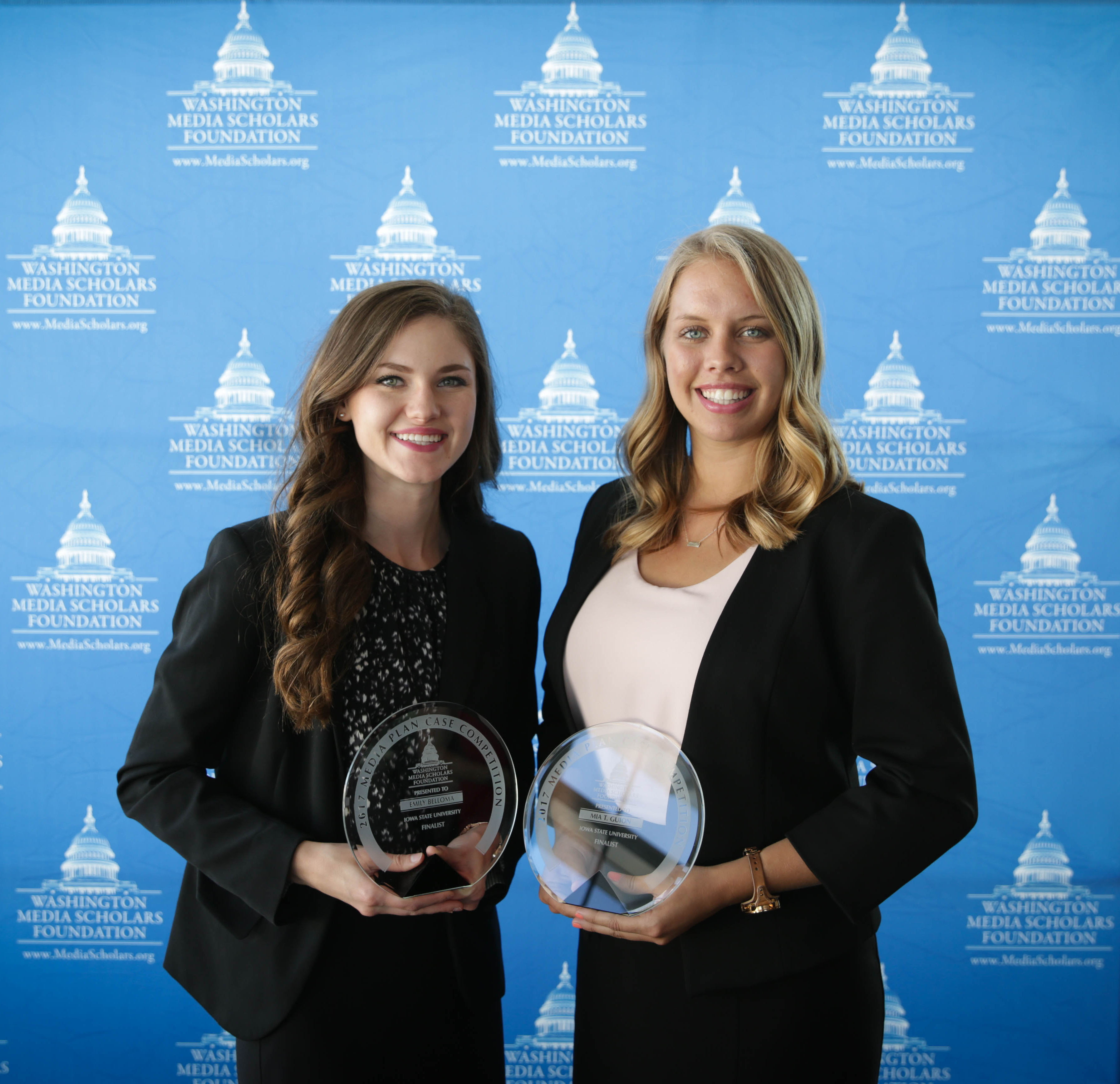
Two recent Greenlee School graduates showcased their knowledge of political media planning in Washington, D.C.
Emily Belloma (’17 marketing, advertising) and Mia Guion (’17 advertising) won the 2017 Media Plan Case Competition, earning the National Excellence in Media Award from the Washington Media Scholars Foundation. Each also received a $5,000 scholarship.
The competition is the cornerstone of the foundation’s Media Scholars Program, which challenges students to apply their knowledge by developing public policy advertising campaigns.
After an initial qualifying round, 30 teams of semi-finalists were invited to participate in the program’s case competition. Of those, only six teams were selected to present their final media plans in person at the Newseum on June 8 and participate in a week of networking and educational opportunities at top advertising, media and broadcast firms in D.C.
This year, the case focused on the campaign of Herman Cain, a 2012 U.S. Republican Party presidential candidate. Competitors were asked to develop a media planning strategy if the early frontrunner had continued his campaign after it became engulfed in controversy and his poll numbers dropped.
Belloma and Guion focused their hypothetical $5 million budget and two-month time frame on tactics that would help Cain win the Iowa caucus and New Hampshire primary.
“Honestly, I think being in Iowa helped me prepare in general. A lot of people don’t understand how important the Iowa caucus is in the campaign, and I think the fact that we focused on the Iowa caucus made our plan stand out,” Belloma said.
In addition to paid media, Belloma and Guion addressed scheduling and appearances, social media efforts, a direct voter contact program, key messages and other public relations strategies.
“One of strengths of the plan was they went back and pulled as much data as they could for how people were using the Internet [in 2011 and 2012], which I thought demonstrated very substantial sophistication of maturity,” said Jay Newell, associate professor at the Greenlee School of Journalism and Communication.
Students from Brigham Young University-Idaho, DePaul University, Ithaca College, the University of South Carolina and Texas Wesleyan University also competed as finalists.
“We were all rooting for each other during the week,” Guion said. “Winning is incredible but the friendships and connections we made were really nice too. [Winning] was secondary to the experience that the Washington Media Scholars Foundation gave us.”
This year’s Media Scholars visited several organizations, including Axios, E.W. Scripps, Fox News, Google, i360, National Media, NBC, Politico and the Washington Post and capped the week with a networking reception attended by over 400 media industry professionals from around the country.
The Washington Media Scholars Foundation is a nonpartisan, nonprofit organization led by Robin D. Roberts that provides the opportunity for college students to gain firsthand knowledge of the public policy advertising field and to meet – and potentially work for – leaders in the media industry. It also provides scholarships to students pursuing careers in related fields.
Since the Media Scholars Program began in 2010, one other Iowa State team has made it to the finals and many have been semi-finalists. This year, another Iowa State team – Maxwell Mussell (‘17 marketing) and Natalie Rokes (‘17 marketing) – made the semi-finalist round.
Newell’s [Fall 2016 Media Planning](/2016/11/07/democracy-depends-on-bursting-the-filter-bubble/) class may have given Belloma and Guion a leg up because it was highly focused on political advertising leading up to the 2016 presidential election. However, he’s most proud that the students applied everything they had learned from Greenlee’s advertising curriculum.
“They did well because of the classes that they had in strategies and research and campaigns, as well as in media planning,” Newell said. “It was very much a schoolwide effort. Their successes reflect some of the successes that go into the program as a whole.”